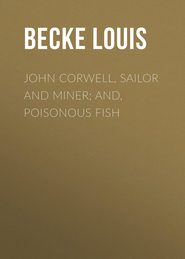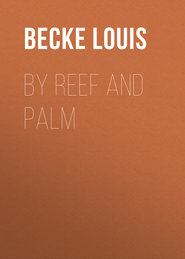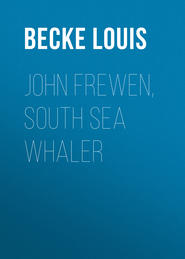По всем вопросам обращайтесь на: info@litportal.ru
(©) 2003-2024.
✖
The Strange Adventure Of James Shervinton
Настройки чтения
Размер шрифта
Высота строк
Поля
He made a peculiar and significant gesture—one that is not often used, but when it is it implies that certain matters or things must not be further alluded to, but must be for ever buried in oblivion. I put my hand on his tough, naked, and wrinkled shoulder, and again repeated my question.
“I know of no dead white man,” he replied, looking me steadily in the face, and yet answering me in his usual respectful manner. Then he sat down beside the low stone wall surrounding the house, and began to pluck the fowl, casually remarking that it was fat for its age.
Somewhat puzzled at the reticence of my servants, I walked across my compound towards the native village, which, as I have before mentioned, was some distance from my house, and as I walked I felt at every footstep a renewed bodily vigour, and almost unconsciously I took out my pipe, filled it, and began to smoke with an enjoyment denied to me for many months.
The day was gloriously bright and cool, and the westering sun on my right hand shone on a sea of the deepest blue, whose placid bosom was dotted by a fleet of canoes with their mat sails spread to the now gentle trade wind, cruising to and fro catching flying fish. This seemed strange to me, bearing in mind the events of the past few hours. The death of a white man, even from natural causes, was of itself generally a matter of such importance to the natives of any of the mid-Pacific isles, that their daily avocations were suspended, and the house of the deceased man would not only be surrounded on the outside by a circle of people sitting on their mats and awaiting their turn to enter and express their condolences with his wife or children, but filled inside as well.
The first houses I passed on the outskirts of the village were occupied only by women and children, who all gave me their usual cheerful greeting of Tiakapo, Simi! (“Good-day, Jim”) and one or two of them added a few words of congratulation upon my improved appearance, and then calmly went on with their work, such as mat-making, mending fishing nets, cooking, etc., but no one of them gave the slightest indication of even having heard that anything unusual had occurred.
Crossing the village square—if it could be so called—I directed my steps towards the great open-sided moniep, or council house, from which came the sound of many voices, talking in the vociferous manner common to all natives of the Gilbert and Kingsmill groups. As I drew near I saw that there were about twenty men seated inside, smoking, card playing, or making cinnet for fishing lines by twisting up the strands of coco-nut fibre on their naked thighs. As they heard my footsteps on the gravel, their conversation dropped a little, but they all gave me Tiakapo! as usual, invited me to enter and sit down and smoke, and then went on with either their work or their pastime.
“Now,” I thought, as I sat down on the mat brought to me, “I shall get these fellows to tell me the meaning of all this reticence about the disposal of Krause’s body.”
For some minutes I smoked in silence and took the opportunity of looking at my hosts. They were all either middle-aged or old men, and were all known to me personally, especially one old bald-headed fellow named Kaibuka—“The Ship.”
In his younger days this Kaibuka had acquired an evil reputation for being the instigator and leader of cutting-off attacks on whaleships and trading vessels, and his performances had gained him such kudos and respect from his savage associates that now in his old age he was the most influential of the three principal head men of the whole lagoon. Like all the others present, he wore but the usual airiri, or girdle of grass, round his loins, and his dark reddish-brown body was covered from head to waist with the scars of wounds received in earlier years. Each of his ear-lobes, pierced in infancy, had from long years of continuous distention by means of rolls of pandanus leaf, become so pendulous that they now hung loosely upon his shoulders in two great bights of thin flesh as thick as a lead pencil, though one of them had twisted in it a long stick of tobacco and a spare pipe. He was not, however, a bad-looking old ruffian, and his shining bald head, still perfect teeth, and extremely Jewish cast of features gave him quite a distinctive appearance from the younger men, whose long coarse hair, cut away across the forehead and hanging loosely down on their shoulders and backs, made their fierce, savage faces appear as if they looked at you from a moving frame of black. They certainly were a wild-looking lot, but their appearance somewhat belied their dispositions—at least as far as I was personally concerned. We had always got along very well together both socially and in business, and I was well aware that whilst they disliked and mistrusted Krause they placed implicit confidence in me.
Putting down my pipe on the mat beside me, I told old Kaibnka that I desired to talk to them.
There was a dead silence at once.
“E rai rai” (“Good”), he said.
“Kaibuka,” I said, “hath the dead white man been taken to his wife?”
He looked stolidly at me for an instant, and then answered with an air of intense surprise.
“Dead white man! What dead white man, Simi? I know of none. We saw no dead white man!”
“Aye, we know of none,” echoed the others in unison.
I began to feel both angry and uncomfortable, and showed it: but for the moment I was too puzzled to do more than stare at them each in turn. They looked straight before them as if their faces were so many stone jugs—they had about as much expression.
Again I addressed myself to Kaibnka.
“Why do ye make this pretence? Thou thyself, Kaibnka, and thou, Berau, were, with many others, in my house when his dead body lay on the floor. Why are ye all so silent? And whither have the girl Niâbon and Tematau gone?”
This time I got an answer—to my last question, at any rate.
“Niâbon and Tematau have gone across the lagoon in a canoe. They desired to talk with the white man’s wife. In a little time, as darkness falls, they will return to thee.”
“Did they take the dead man with them, then?” I persisted.
The old fellow met my inquiring glance quite calmly. “I know of no dead man, Simi.”
I glared angrily at them all round, and then for a moment wondered if they were all crazy or I alone was wrong in my head. I was rising to my feet with an exclamation of anger at their obstinacy when the old bald-head motioned me to stay. Then at a sign from him all the others gathered up their impedimenta and quietly went off in Tarions directions, leaving us alone.
“Simi,” he said, coming swiftly over and crouching in front of me, “be wise. Ask no one of the white man who was here yesterday; for no one will tell thee but Niâbon. There is death in store for many, many people, if ye heed not my words. Go back to thy house, and be patient and wait, and ask naught of any one but Niâbon of what is past. Wouldst thou see this land soaked in blood because of one man?”
He spoke in such curious, whispered tones, and kept his keen hawk-like face so close to mine that I saw he was in deadly earnest.
“Promise me, Simi. Promise me to rest in thy house and wait for Niâbon.”
“As you will, I shall wait.”
I walked slowly back to my house and took a stiff glass of grog to steady my nerves, which were beginning to feel a little upset.
“It’s time I got out of this place,” I thought, as, lighting my pipe, I went down to my boat again and busied myself in taking out all her fittings, examining and replacing them again.
When I returned to the house for my supper it was quite dark, and just as my lamp was lit Niâbon entered.
CHAPTER V
Thinking it would be wiser to refrain from asking her any questions until she had at least rested a little—for she seemed to be very weary—I said nothing to her but a few words of welcome, and bade my servants lay the supper, then told her that I was sure she was both hungry and tired. She replied that she certainly was tired, having come on foot from Taritai to save time. The canoe with Tematau was to follow on later in the night when the tide turned, and when there would be more water on the upper sand flats of the lagoon.
“Very well, Niâbon,” I said in English, “now sit down and drink a cup of tea and eat a little. Then we can talk.”
“I have many things of which to tell thee, Simi,” she said, “for I have been speaking long with the wife of the man Krause, and–”
I told her that it would please me better if she first ate something. She at once obeyed, but instead of sitting at the table with me she seated herself on a mat near me, and Pai waited upon her whilst big Tepi attended to me. Only once did she speak during the meal, when she asked me if I had had any recurrence of either fever or ague, and she was undoubtedly pleased when I said that I had not, and that another coarse or two of her medicine would, I believed, care me. She smiled, and told me she would make more of the mixture that evening.
After eating a very slight sapper she made herself a cigarette and sat and smoked until I had finished my pipe. Then she came a little nearer to me, and I felt ashamed of myself for not having asked her if her neck gave her much pain, for I now noticed that the neck and front of her dress were blood-stained. She made light of the wound, however; said it was but skin deep, and would be healed in a few days. But I insisted upon her letting me see for myself. She consented somewhat unwillingly, and I saw that she had had a very narrow escape, the heavy bullet from Krause’s Derringer having scored her neck pretty deeply and made a wound nearly two inches long. She had, however, she told me, had it attended to by Mrs. Krause, who had done the very best thing that could have been done to a superficial injury of the kind—painted it liberally with Friar’s Balsam, which though causing intense pain for a few minutes, had quickly stayed the flow of blood and prevented any inflammation from setting in.
“Is Mrs. Krause well, Niàbon?” I asked as I readjusted the bandage.
“She is well.”
“And she knows how her husband died?”
“She knows how he died, but knows not whose were the hands that dealt the blows. And, Simi, it is well that she does not know, for I am her friend, and it would grieve her did she know all.”
I thought a moment or two before answering—
“How can the truth be kept from her, Niâbon? There are many people who know ‘twas thee and Tematau who slew him.”
“She will never know, Simi,” she asserted earnestly; “there is but one man who could tell her, and him she will not ask.”
“Who is that?” I asked wonderingly.
“Thyself.”
“Why should she not ask me? Her husband met his death in my house. I saw his body lying at my feet. Dost think she will fail to question me if others whom she may ask remain silent?”
“She will ask thee no questions concerning him. His death hath taken away from her a terror by day and bad dreams at night that for two years hath wrung her heart and weakened her body, which is but frail. Have pity on her, Simi, and say nothing to her when thou seest her of her dead husband. He is gone; and yet, although she wept when I told her he was dead, and she knelt and prayed for his spirit which has gone beyond, I know well that now some peace hath come into her heart. And I have given her sleep.”
As she spoke she turned her strangely sombrous and liquid eyes to mine in such an appealing glance that I could not resist her magnetic power, strive as I would.
“I will do as you wish, Niâbon,” I said, falling weakly into English again. “You are a strange girl, but I am sure that you mean well, not alone to me, but to that poor heartbroken woman. But you must tell me the meaning of all this strange silence on the part of the people of this village. Why do they deny the death of Krause? How can they conceal it? It cannot possibly be hidden. There is a German man-of-war coming to this island soon—Mrs. Krause herself told me—and how will these people account to the captain for his death? You and Tematau, who together killed him, cannot escape. And if I am questioned—as I shall be—what can I do? I cannot lie about a murder.”











